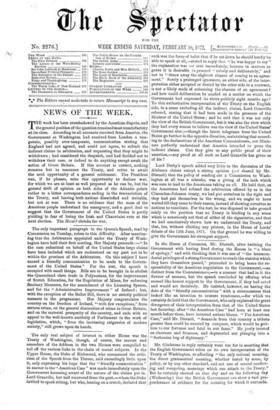In the House of Commons, Mr. Disraeli, after twitting the
Government with having lived during the Recess in " a blaze of apology," and with thinking that it was one of " the transcen- dental privileges of a strong Government to evade the statutes which they have themselves passed," proceeded to bring home the re- sponsibility of the American negotiation to the Government,—as distinct from the Commissioners,—in a manner that had in it the flavour of menace, but the speech concluded by offering what seemed like honest support to the Government, if they had acted and would act decisively. He insisted, however, on having the date of the " friendly communication" with a strenuousness that looked like an intention to censure remissness,—for which we certainly do hold that the Government, who only explained the great divergence of their interpretation from that of the United States last Saturday, after " the American Case " had been at least one month before them, have incurred serious blame. " The American Case," said Mr. Disraeli, " demands from this country a tribute greater than could be exacted by conquest, which would be peri- lous to our fortunes and fatal to our fame." He justly insisted on clearness and firmness, and deprecated our plunging into a " Serbonian bog of diplomacy."


































